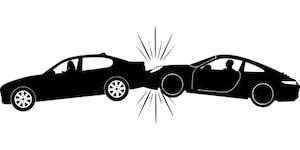Hurt in a Car Accident or
Motorcycle Crash? Lost a Loved
One in a Wrongful Death?
Brooksville, FL Tailgating Crash

Tailgating driving, or following too closely, is a traffic violation that most commonly falls under the category of reckless driving in Florida. Florida Statute 316.0895 defines the law pertaining to following too closely. Tailgating is typically cited as a cause of accidents, which can be very helpful when assessing fault and liability for insurance reasons.
Tailgating is sometimes seen as road rage. While frustration while driving is normal, it should never lead to a serious crash. The NHTSA reports that 14 out of every 10,000 drivers in the U.S. have been ticketed for tailgating driving. Additionally, 33% of all auto accidents in the country are rear-end collisions, often caused by tailgating..
Tailgating often causes accidents, and people generally assume the driver in the rear is at fault because they didn’t leave enough space to stop or slow down before colliding with the vehicle ahead. Maintain a safe distance from the car in front to avoid collisions. A good rule is to follow for three seconds or keep one car length for every 10 mph. If you’re driving at 20 mph, keep two car lengths between you and the car ahead. At 60 mph on the highway, maintain a six-car length distance.
Judging the right distance between your car and the one ahead can be tricky. The rules vary based on speed, weather, and road conditions. Tailgating often causes accidents and signals aggressive or distracted driving. The AAA Foundation for Traffic Safety conducted a study that found texting while driving makes you seven times more likely to rear-end the car in front of you.
Is the Tailing Driver Always Responsible for a Rear-End Collision?
The tailing driver is actually not always at fault when it comes to causing a rear-end crash. While many assume that the driver who rear-ends another car is always at fault, certain scenarios can shift the blame to the driver who got rear-ended. These include:
- A driver stopping too quickly to try and execute a turn
- A driver reversing suddenly
- A driver’s brake lights not working
In any of the above situations, the driver of the rear-ended car would likely be found at fault.
The NHTSA states that rear-end collisions are the most common type of crash in the U.S. These accidents can cause severe injuries and even wrongful death. Our Brooksville Tailgating Crash Attorneys at Whittel and Melton can help if you have been injured in a tailgating driving accident. We will investigate your crash, gather crucial evidence and hold the at-fault driver accountable for their negligence.
Our Spring Hill rear-end car accident injury lawyers want to remind you that every driver must follow the rules of the road. Failing to do so, leading to injury, is considered negligence.
We can help you file a claim for compensation for your damages and make sure you receive fair compensation for your pain and suffering. Contact us for a free consultation at 352-666-2121 or online.
















